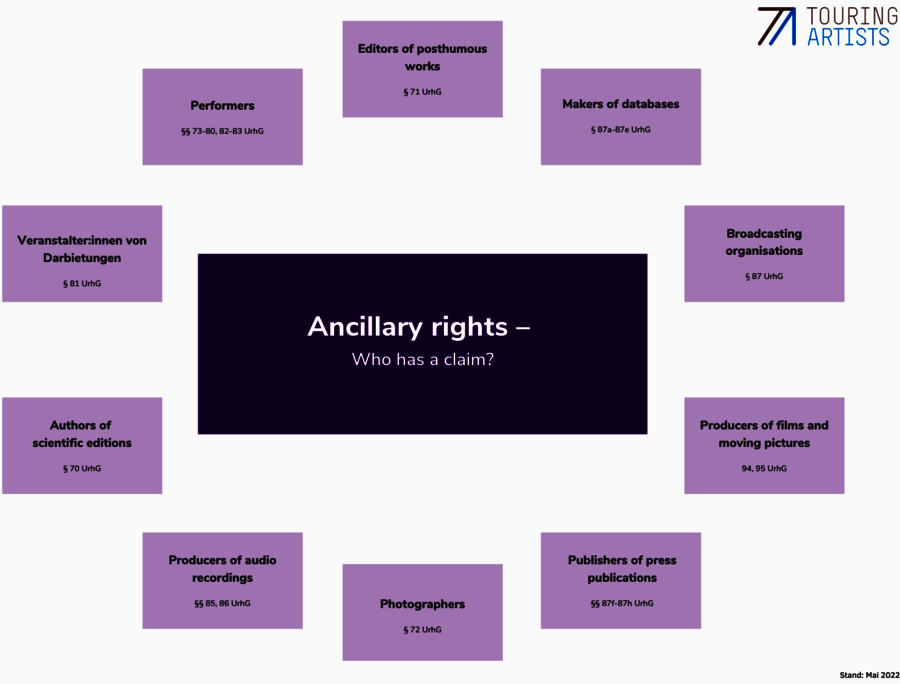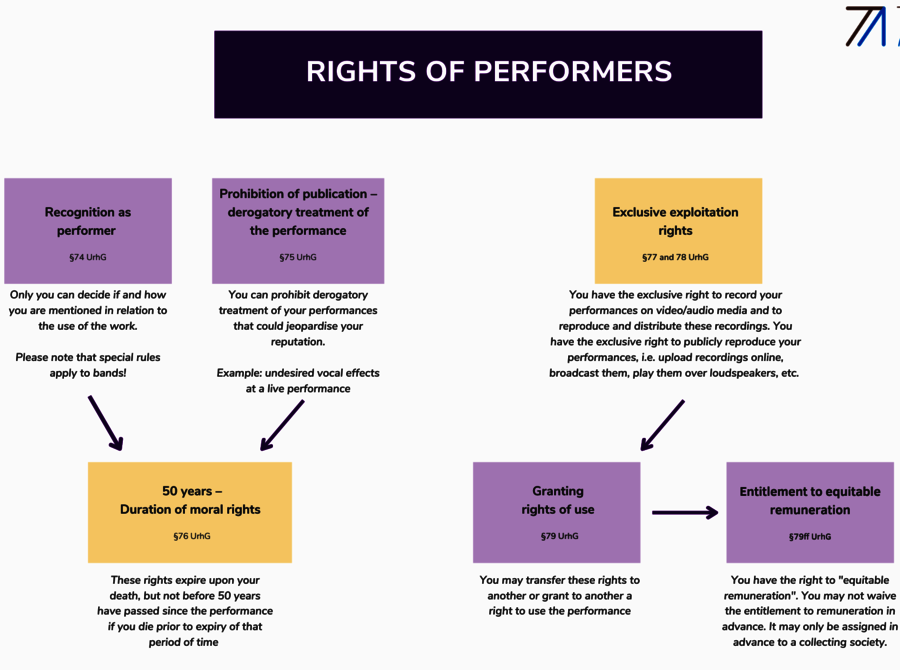Organisers and performers
What rights do organisers or performers have?
Copyright protects not only authors but also other service providers involved in the creative process through ancillary copyrights.
The following figure shows who is entitled to ancillary copyright protection.
Ancillary copyrights of performing artists
For the purposes of the German Copyright Act, a performing artist "means a person who performs, sings, acts or in another manner presents a work or an expression of popular art or who participates artistically in such a presentation" (Section 73 German Copyright Act). The object of protection is the artistic/intellectual performance of the performer. Athletic, acrobatic and similar performances are excluded from protection.
In the stage and film sectors, this means that extras often do not enjoy protection because, unlike actors, they do not perform any artistic work of their own. The concept of "interpretation" is important in classifying a performance.
In Germany, performers who wish to receive remuneration for secondary exploitation – for example, for a repeat television broadcast of a film production for which remuneration has already been paid, or for the uploading of music productions –must conclude a collecting agreement with the GVL (Society for the Exploitation of Performance Rights). Otherwise, individual performers usually have no or hardly any opportunity – partly for legal reasons, partly for practical reasons – to benefit from the considerable sums that circulate in the creative industries for these types of use.
Rights of performers
The following figure shows the ancillary copyrights of performers in Germany
A musician plays in an orchestra that performs nationally and internationally. Orchestra musicians are usually employees. The ancillary rights are transferred to the orchestra or the institution in return for a fee. In the case of German orchestras, the claim is based on the collective agreement for musicians in cultural orchestras, among other things, or otherwise on the employment contract. In the event of non-equitable remuneration, the musician must assert their claim against the orchestra or theatre.
Ancillary copyright of the organiser
One peculiarity of German law is the granting of an ancillary copyright to the organiser of an event. This right, derived from Section 81 German Copyright Act, applies only in the case of artistic events. If one part of the event is artistic and another is not, the organiser is only entitled to the right for the artistic part, e.g. for a musical performance at a political event. This enables the organiser to defend themselves against the unauthorised recording, reproduction and distribution of this event. In this respect, the GWVR (Gesellschaft zur Wahrnehmung von Veranstalterrechten; collecting society for event organisers) coordinates with the GVL with regard to the exercising of the ancillary copyrights of the organisers.
This right is not only available to German organisers, but also to foreign ones, provided that the events in question are held in Germany. A restriction may apply to companies that are not based in the EU.
A dance hall (organiser) records a production created and performed in Germany and intends to distribute the recording as a DVD. What contractual regulations must be included with regard to the international artists involved in the production as performers? Do collecting societies play a role here?
A contract must be concluded with the international artists in which the organiser is granted the right to record the performance and then distribute it on DVD. The contract must also specify where (in which countries) the distribution is to take place and whether the distribution is to take place only via DVD or possibly also via the Internet, e.g. by means of streaming. The same also applies to the reverse case, where a dance company wishes to record its performance on DVD at a certain venue, for example. In this case, a contract must be concluded with the organiser. Pursuant to Section 81 German Copyright Act, the organiser, together with the performers, has an ancillary copyright to the event they organised.
Documents
Collecting agreement, GVL
Collecting agreement BG I+II, VG Bild-Kunst (German)
Collecting agreement BG III, VG Bild-Kunst (German)

